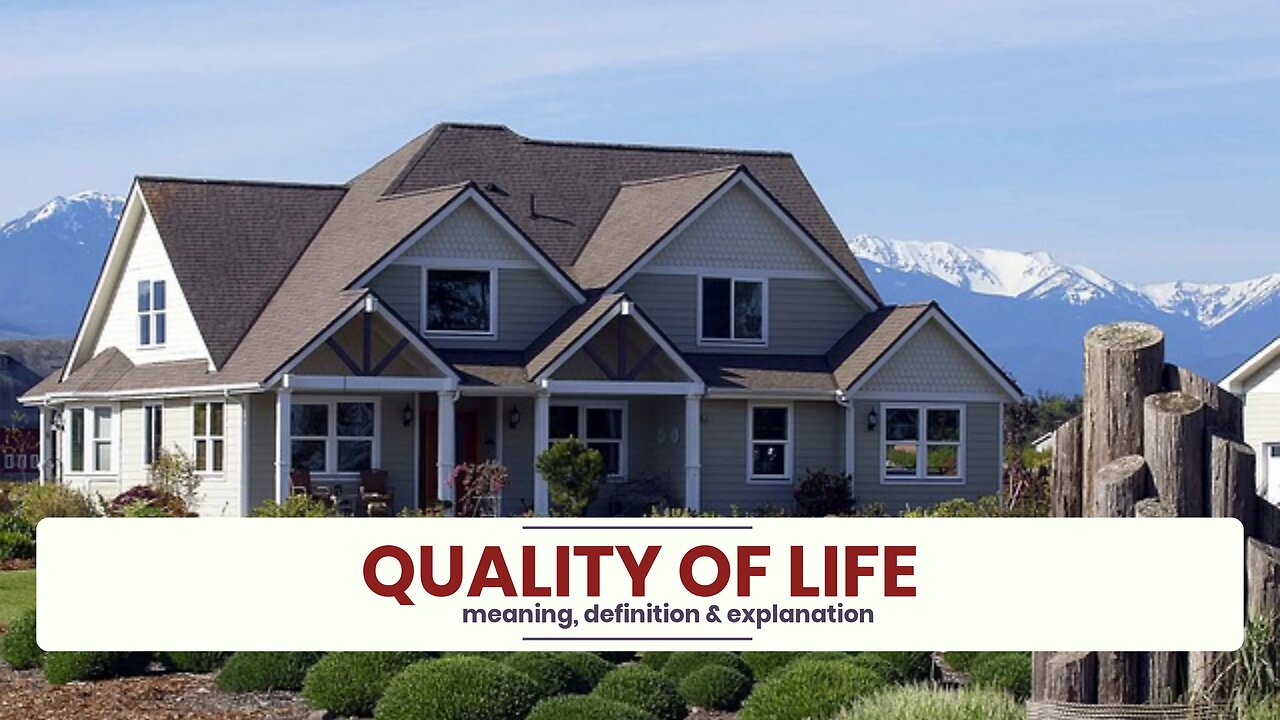Premium Only Content

What is QUALITY OF LIFE?
✪✪✪✪✪
http://www.theaudiopedia.com
✪✪✪✪✪
What does QUALITY OF LIFE mean? QUALITY OF LIFE meaning - QUALITY OF LIFE definition - QUALITY OF LIFE explanation. What is the meaning of QUALITY OF LIFE? What is the definition of QUALITY OF LIFE? What does QUALITY OF LIFE stand for? What is QUALITY OF LIFE meaning? What is QUALITY OF LIFE definition?
Quality of life (QOL) is the general well-being of individuals and societies, outlining negative and positive features of life. It observes life satisfaction, including everything from physical health, family, education, employment, wealth, religious beliefs, finance and the environment. QOL has a wide range of contexts, including the fields of international development, healthcare, politics and employment. It is important not to mix up the concept of QOL with a more recent growing area of health related QOL (HRQOL). When we look at HRQOL we in effect look at QOL and its relationship with health.
Quality of life should not be confused with the concept of standard of living, which is based primarily on income.
Unlike per capita GDP or standard of living, both of which can be measured in financial terms, it is harder to make objective or long-term measurements of the quality of life experienced by nations or other groups of people. Researchers have begun in recent times to distinguish two aspects of personal well-being: Emotional well-being, in which respondents are asked about the quality of their everyday emotional experiences—the frequency and intensity of their experiences of, for example, joy, stress, sadness, anger, and affection— and life evaluation, in which respondents are asked to think about their life in general and evaluate it against a scale. Such and other systems and scales of measurement have been in use for some time. Research has attempted to examine the relationship between quality of life and productivity. There are many different methods of measuring quality of life in terms of health care, wealth and materialistic goods. However, it is much more difficult to measure meaningful expression of one's desires. One way to do so is to evaluate the scope of how individuals have fulfilled their own ideals. Quality of life can simply mean happiness, the subjective state of mind. By using that mentality, citizens of a developing country appreciate more since they are content with the basic necessities of health care, education and child protection.
Quality of life is an important concept in the field of international development, since it allows development to be analyzed on a measure broader than standard of living. Within development theory, however, there are varying ideas concerning what constitutes desirable change for a particular society, and the different ways that quality of life is defined by institutions therefore shapes how these organizations work for its improvement as a whole.
Organisations such as the World Bank, for example, declare a goal of "working for a world free of poverty", with poverty defined as a lack of basic human needs, such as food, water, shelter, freedom, access to education, healthcare, or employment. In other words, poverty is defined as a low quality of life. Using this definition, the World Bank works towards improving quality of life through neoliberal means, with the stated goal of lowering poverty and helping people afford a better quality of life.
Other organizations, however, may also work towards improved global quality of life using a slightly different definition and substantially different methods. Many NGOs do not focus at all on reducing poverty on a national or international scale, but rather attempt to improve quality of life for individuals or communities. One example would be sponsorship programs that provide material aid for specific individuals. Although many organizations of this type may still talk about fighting poverty, the methods are significantly different.
Improving quality of life involves action not only by NGOs, but also by governments. Global health has the potential to achieve greater political presence if governments were to incorporate aspects of human security into foreign policy. Stressing individuals’ basic rights to health, food, shelter, and freedom addresses prominent inter-sectoral problems negatively impacting today’s society and may lead to greater action and resources. Integration of global health concerns into foreign policy may be hampered by approaches that are shaped by the overarching roles of defense and diplomacy.
-
 2:28
2:28
The Audiopedia
1 year agoWhat is MORTGAGE BROKER?
27 -
 1:31:04
1:31:04
Rebel News
2 days agoTommy Robinson & Avi Yemini Banned from Al-Aqsa mosque!
16.3K38 -
 16:07
16:07
Nikko Ortiz
2 days agoSora 2 Must Be Stopped
3.92K6 -
 LIVE
LIVE
Lofi Girl
3 years agolofi hip hop radio 📚 - beats to relax/study to
105 watching -
 59:58
59:58
Man in America
12 hours agoHow Big Pharma Turned Cancer Into a TRILLION-DOLLAR Business
351K41 -
 9:11:52
9:11:52
SpartakusLIVE
10 hours ago#1 Solo Savant stream DEEP into the night || PUBG Later Tonight?!
73.4K5 -
 13:56
13:56
Clintonjaws
15 hours ago $33.57 earnedEntire Room Speechless As Poilievre Snaps & Puts TV Hosts In Their Place
49.5K26 -
 4:23:32
4:23:32
EricJohnPizzaArtist
1 day agoAwesome Sauce PIZZA ART LIVE Ep. #67: HALLOWEEN SPECIAL tribute to “Need to Breathe”
59.7K15 -
 2:26:26
2:26:26
Nerdrotic
11 hours ago $52.95 earned3I/Atlas : A Cosmic Horror or a New Interstellar Understanding? | Forbidden Frontier #122
209K21 -
 54:56
54:56
Sarah Westall
8 hours agoHidden Biblical Writings: Evidence Based Investigation, Worlds First Collection w/ Matthew McWhorter
33.4K28